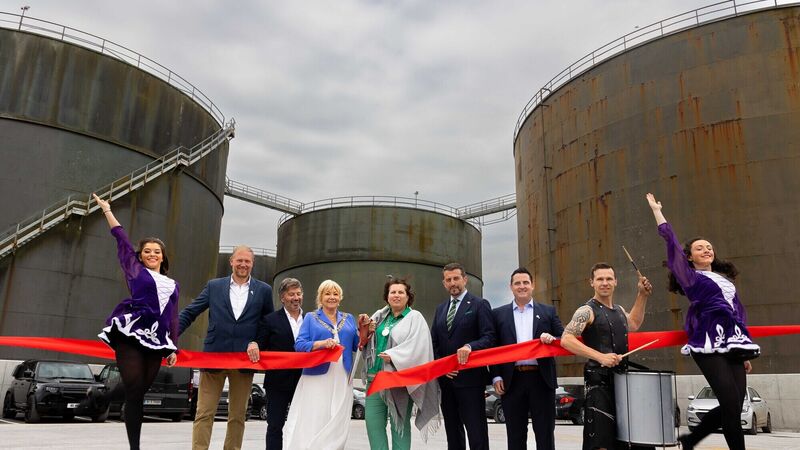Country's first biofuel terminal officially opens in Cork

William Tebbit, chief executive of GBF; Magnus Hammick, chief executive of Green Biofuels Limited UK; Cllr Deirdre Forde, lord mayor of Cork; Cllr Audrey Buckley, deputy mayor of the County of Cork; Conor Mowlds, chief commercial officer of the Port of Cork Company; Peter O'Brien, Ireland manager of GBF Ireland Ltd, with performers Aoibhin Kenneally (left), Kevin Curran and Aoibhin Marren (right), as leading sustainable biofuel supplier GBF officially launched Ireland’s first low-carbon biofuel terminal at Ringaskiddy, Co Cork, on Thursday. Picture: Michael O'Sullivan /OSM
Ireland’s first renewable biofuel terminal will service the country’s surging demand for cleaner greener fuels and play a key role in reducing carbon emissions in diesel-reliant industries.
British biofuel supplier Green Biofuels Limited (GBF) officially opened the facility in Ringaskiddy, Co Cork, on Thursday, where it has invested some €30m in the site to initially store 38m litres of its hydrotreated vegetable oil (HVO) biofuel called Gd+.
The clean fuel is made from waste biomass feedstocks, waste vegetable oils and animal fats, and is a “drop-in diesel replacement” which the company says can reduce tailpipe emissions by up to 85% compared to fossil fuel diesel.
HVO can be filled into fuel tanks and used by any diesel-consuming engines without the need for engine modifications. It is already being used in the construction, haulage and freight, shipping, and agriculture sectors.
It is the lowest emission diesel replacement fuel available in Britain and Ireland and is viewed as an interim solution while work continues on the development of even cleaner alternatives to standard fossil fuels.
Ireland imported 8m litres of HVO biofuels in 2021 and GBF plans to use the Cork site’s full 54m litre storage capacity over the coming years.
The company also announced it had agreed with the Port of Cork Company the use of a dedicated jetty with a 259m berth that will be used to pump HVO biofuel directly to and from vessels.
The facility will in time be used to import, export, store and distribute the biofuel, helping to service the accelerating demand for HVO biofuel in Ireland and acting as an overseas supply hub contributing to national export revenues, the company said.
The terminal on a six-acre site had lain vacant for about a decade until it was bought by GBF in 2022.
The company has since ploughed €30m into its redevelopment, including the repurposing of the five-cylinder storage tanks, extensive safety updates, engineering and concrete works, and the commissioning of a full-service 24/7 refuelling station. The site is now operated by Irish subsidiary Green D Project Limited.
GBF chief executive William Tebbit said Cork Harbour was a prime location, and home to “a welcoming and pro-business community with a strong sustainability ethos”.
“It is an ideal energy hub with excellent access and infrastructure which will enable us to supply customers all over Ireland and the UK now and in the future,” he said.
“At GBF we are committed to reducing the environmental impact of transport and energy.
“Our mission is to ensure the transition to net zero is practical, cost-effective and successful.
The Port of Cork’s chief commercial officer Conor Mowlds said the official opening of the facility, which took its first delivery in January, marks a significant step towards Ireland’s green energy future.
“From a Port of Cork perspective, having this facility on our doorstep gives us 24/7 access to sustainable energy and we are going to be using this fuel to power our cranes and vessels so that we too play our part in making Ireland’s economy more sustainable,” he said.
Ireland’s Climate Action Plan commits Ireland to a legally binding target of net-zero greenhouse gas emissions no later than 2050, with a reduction of 51% by 2030.
CLIMATE & SUSTAINABILITY HUB





